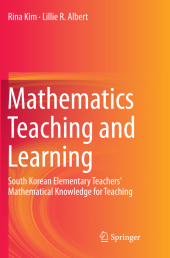 Neuerscheinungen 2016Stand: 2020-02-01 |
Schnellsuche
ISBN/Stichwort/Autor
|
Herderstraße 10
10625 Berlin
Tel.: 030 315 714 16
Fax 030 315 714 14
info@buchspektrum.de |

Lillie R. Albert, Rina Kim
(Beteiligte)
Mathematics Teaching and Learning
South Korean Elementary Teachers´ Mathematical Knowledge for Teaching
Softcover reprint of the original 1st ed. 2015. 2016. xv, 152 S. 24 SW-Abb., 2 Farbabb., 22 Tabellen. 2
Verlag/Jahr: SPRINGER, BERLIN; SPRINGER INTERNATIONAL PUBLISHING 2016
ISBN: 3-319-36615-7 (3319366157)
Neue ISBN: 978-3-319-36615-9 (9783319366159)
Preis und Lieferzeit: Bitte klicken
The purpose of this research is to identify the categories of South Korean elementary teachers´ knowledge for teaching mathematics. Emerging from the data collected and the subsequent analysis are five categories of South Korean elementary teachers´ knowledge for teaching mathematics: Mathematics Curriculum Knowledge, Mathematics Learner Knowledge, Fundamental Mathematics Conceptual Knowledge, Mathematics Pedagogical Content Knowledge, and Mathematics Pedagogical Procedural Knowledge. The first three categories of knowledge play a significant role in mathematics instruction as an integrated form within Mathematics Pedagogical Content Knowledge. This study also demonstrated that Mathematics Pedagogical Procedural Knowledge might play a pivotal role in constructing Mathematics Pedagogical Content Knowledge. These findings are connected to results from relevant studies in terms of the significant role of teachers´ knowledge in mathematics instruction.
CHAPTER 1: Introduction.- 1.1. Why elementary teachers´ knowledge matter.- 1.2. Purpose of the Study and Research Question.- 1.3. Framework.- 1.3.1. Theoretical Orientation.- 1.3.2. Conceptual Framework.- 1.4. Organization of the Book.- References.- CHAPTER 2: A Pedagogical Overview of Related Research.- 2.1. Introduction.- 2.2. Sociocultural Theory.- 2.3. Research on Teachers´ Mathematical Knowledge for Teaching.- 2.3.1. Shulman´s Research on Teachers´ Knowledge for Teaching.- 2.3.2. Fennema and Franke´s Research on Mathematics Teachers´ Knowledge .- 2.3.3. Hill, Ball and Schilling´s Research on Teachers´ Mathematical Knowledge for Teaching.- 2.3.4. Mishra and Koehler´s New Category of Teachers´ Mathematical Knowledge for Teaching.- 2.5. Interpretive Summary and Critical Analysis.-References.- CHAPTER 3: Methodology.- 3.1. Introduction.- 3.2. Research Design.- 3.3. Participants.- 3.4. Settings.- 3.5. Data Collection.-3.6. Data Analysis.- References.- CHAPTER 4: Context of Elementary Mathematics Education in South Korea.- 4.1. Introduction.- 4.2. The National Curriculum in South Korea.- 4.3. The National Curriculum and Education Fever in South Korea.- 4.4. The National Mathematics Curriculum at the Elementary Level in South Korea .- 4.5. Summary.-References.- CHAPTER 5: Mathematics Curriculum Knowledge (MCK).- 5.1. Introduction.- 5.2. Mathematics Curriculum Knowledge in Mathematics Instruction.- 5.2.1. Using MCK When Developing and Instructional Process.- 5.2.2. Using MCK When Teaching the Lesson in a Classroom.- 5.2.3. Using MCK When Assessing Students´ Work.- 5.3. Interpretative Summary.- References.- CHAPTER 6: Mathematics Learner Knowledge (MLK).- 6.1. Introduction.- 6.2. Mathematics Learner Knowledge.- 6.3. Mathematics Learner Knowledge in Mathematics Instruction.- 6.3.1. Using MLK When Developing and Instructional Process.- 6.3.2. Using MCK When Teaching the Lesson in a Classroom.- 6.3.3. Using MLK When Assessing Students´ Work.- 6.4 Interpretative Summary.- References.- CHAPTER 7: Fundamental Mathematics Conceptual Knowledge (FMCK).- 7.1. Introduction.- 7.2. Fundamental Mathematics Conceptual Knowledge.- 7.3. Fundamental Mathematics Conceptual Knowledge in Mathematics Instruction.- 7.3.1. Using FMCK When Developing and Instructional Process.- 7.3.2. Using FMCK When Teaching the Lesson in a Classroom.- 7.3.3. Using FMLK When Assessing Students´ Work.- 7.4. Interpretative Summary.- References.- CHAPTER 8: Mathematics Pedagogical Content Knowledge (MPCK) and Mathematics Pedagogical Procedural Knowledge (MPPK).- 8.1. Introduction.- 8.2. The Nature of Categories of Knowledge for Teaching Mathematics.- 8.3. The Relationship Among Categories of Knowledge for Teaching Mathematics.- 8.4. Mathematics Pedagogical Content Knowledge.- 8.5. Mathematics Pedagogical Procedural Knowledge.- 8.6. The Structure of South Korean Elementary Teachers´ Knowledge for Teaching Mathematics.- 8.7. Interpretative Summary.- References.- CHAPTER 9: Concluding Remarks, Implications and Future Directions.- 9.1. Introduction.- 9.2. Relationship Among the Categories of Mathematical Knowledge.- 9.3. Conclusion and Implications.-9.5. Future Directions.- 9.6. Closing Comments.- References.


